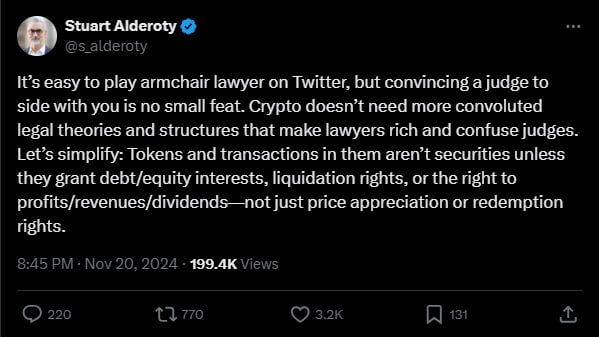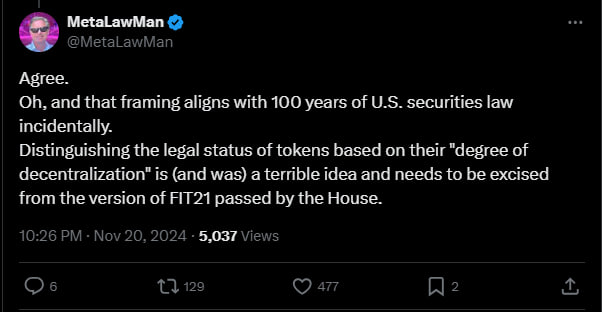- Simplified crypto guidelines align with securities regulation, supporting readability and fostering innovation.
- Decentralization metrics in token regulation create vagueness, risking authorized inconsistency.
- FIT21 revisions can improve enforcement by eradicating decentralization as a defining criterion.
Crypto tokens categorised as securities have been a hot-button concern throughout the digital asset house. As an alternative, Stuart Alderoty, Chief Authorized Officer at Ripple, advocates for a simplified strategy to crypto regulation. He asserts that solely tokens with fairness or revenue rights ought to be categorised as securities. This strategy can, he says, cut back authorized ambiguity.
Alderoty believes this focused strategy would higher align with established securities regulation and provide readability for all events concerned.
These circumstances happen when tokens embody monetary rights like fairness, debt pursuits, or entitlements to earnings or liquidation proceeds. Simplifying these standards reduces authorized ambiguity and helps innovation with out pointless authorized entanglements.

Reassessing Decentralization as a Defining Metric
Additional famous by MetaLawMan, crypto regulation usually suffers from an over-reliance on subjective metrics like decentralization. Utilizing decentralization to find out a token’s authorized standing introduces vagueness right into a framework that ought to be predictable.
This, in flip, creates uncertainty and permits legal professionals to capitalize on unclear guidelines, leaving judges and regulators to grapple with pointless complexity. Consequently, builders and buyers face dangers as a result of inconsistent authorized interpretations. Simplifying these definitions would scale back litigation prices, foster belief, and encourage the accountable use of blockchain expertise.

Alignment with Established Securities Legislation
U.S. securities regulation, refined over a century, affords clear precedents for figuring out what constitutes a safety. Tokens granting rights to dividends, income shares, or liquidation proceeds are just like conventional securities and ought to be regulated accordingly.
Nevertheless, tokens that solely provide value appreciation or redemption rights lack these crucial traits. Due to this fact, making use of established ideas ensures regulatory choices are according to historic practices, offering a strong basis for each new and skilled market members.
Proposed Legislative Changes
The present draft of the Monetary Innovation and Know-how for the twenty first Century Act (FIT21) depends on decentralization metrics to categorise tokens. Nevertheless, this strategy ought to be revised to mirror a extra sensible and constant framework.
Moreover, eradicating decentralization as a defining criterion ensures that laws are clearer and simpler to implement. Consequently, this adjustment would scale back pointless authorized disputes, permitting stakeholders to give attention to significant innovation moderately than compliance uncertainties.
Disclaimer: The data introduced on this article is for informational and academic functions solely. The article doesn’t represent monetary recommendation or recommendation of any form. Coin Version isn’t chargeable for any losses incurred on account of the utilization of content material, merchandise, or companies talked about. Readers are suggested to train warning earlier than taking any motion associated to the corporate.

